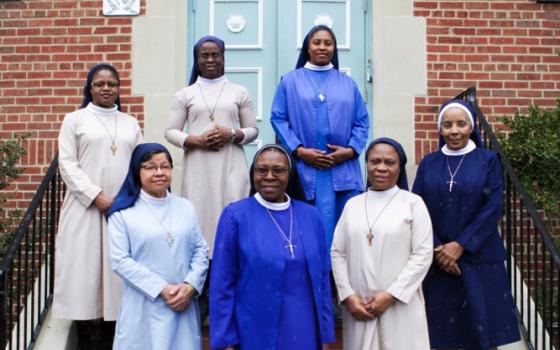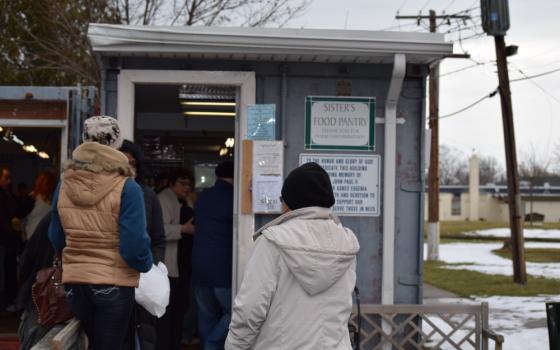Earlier this month, the Franciscan Handmaids of the Most Pure Heart of Mary announced they will sell their Harlem motherhouse as part of a restructuring effort.
The congregation, which drew national attention last year after actress Whoopi Goldberg gave the sisters $10,000 and a van on the talk show "The View," is one of three mostly black communities of women religious in the United States.
"We need to expand to places outside of New York as our number increases," said Sr. Gertrude Lilly Ihenacho, head of the congregation.
After almost closing their doors in 2010, the congregation has since doubled its membership to 24 women and currently has seven women from six countries in formation, the congregation said in a press release. Most of this growth is happening in Africa and the U.S. Virgin Islands, while only three sisters live in the five-story, 18,216-square-foot motherhouse.
"We can't keep on maintaining an empty building," Ihenacho told Global Sisters Report.
Instead, the sisters want to direct their resources toward expanding their day care and food pantry in Harlem and Staten Island, respectively, and also toward providing theological education for their growing number of postulants.
The anticipated property sale comes at a time when Harlem is experiencing vertiginous rates of development that have priced many low-income black households out of their neighborhoods. For the time being, Harlem, once the epicenter of a black cultural renaissance, remains predominantly black. However, according to data from New York University's Furman Center, from 2000 to 2015, central Harlem saw the number of white households grow from 2.1 percent to 15 percent and the number of households with an income greater than $250,000 rise from 1.1 percent to 3.6 percent. There were similar jumps in east Harlem during that same period.
Thus far, Mount Morris Park, the Harlem neighborhood where the Franciscan Handmaid motherhouse is located, has remained largely untouched by developers, but that's because the south and west sides of the neighborhood are part of a protected historic district, said Patricia Eaton, founder of the Mount Morris Park Community Improvement Association. The north side, where the motherhouse stands, is not protected, meaning whoever buys the building can tear it down and replace it with whatever they want.
"Because of its size, I'm sure every major developer is looking at the property," Eaton told GSR, adding that Maya Angelou's former Mount Morris Park home recently sold for $4 million. "I think everyone on the block is concerned about this sale."
While it's possible that the motherhouse won't become the site of new luxury apartments, Kevin McGruder, author of a recent book on race and real estate in Harlem, said given the presumed purchase price for the building, that's unlikely. (CBRE, the real estate firm facilitating the sale, did not respond to Global Sisters Report's requests for information about the asking price, and at the time of publication, the property was not listed on their website.)
"I think it's doubtful that a nonprofit would be able to buy it," McGruder said. "It's unlikely that it's going to be housing for low- and moderate-income people, unless there's an angel buyer who buys it and then donates it to a nonprofit. Then they could get subsidies to renovate it for affordable housing."
Ihenacho is well aware of what the sisters' property sale could mean for Mount Morris Park; she's watched gentrification decimate Harlem's already-small black Catholic population. Still, she is unafraid of what might happen to the motherhouse once the sisters leave.
"We are women of prayer," she said. "The Lord's hand is still in it and will guide the buyers and us to the right path. So building condominiums? Well, it might happen. It might not happen."
She added that the sisters chose CBRE to handle the sale because the firm had worked with the Catholic church in New York City. They also facilitated the sale of the Sisters of Divine Compassion's 16-acre White Plains, New York, property in 2014.
"So I'm not afraid. Once we have sold it, it's no more in our control, right?" Ihenacho said. "The congregation is not going to keep the empty building standing because we are afraid they might use it for whatever, whatever. I don't think they are going to use it for anything immoral."
Ihenacho also wants to make it clear that the sisters are not abandoning Harlem or New York City's black population. They hope to either relocate to another facility in Harlem or to build one.
"We were founded as colored sisters for colored people, and we're still committed to that," she said. "We are not going to discriminate and say we are not going to work among other poor people because they are not black — but we know that in this country, most poverty falls on blacks."
[Dawn Araujo-Hawkins is a Global Sisters Report staff writer. Her email address is [email protected]. Follow her on Twitter: @dawn_cherie.]


